Beyond the Screen: Redefining Reality, Identity and Relationships in the Digital Age
Exploring the ethical complexities and evolving dynamics of mediated intimacy and digital connections with Future Friends.
It finally feels like summer in London, making it incredibly hard to focus on anything beyond the sun hitting my face. Last week, I had the privilege of presenting at the London edition of
’ 333: 3 Trends, 3 Slides, 3 Minutes.I have been spending a lot of time thinking about the shifts that are redefining human connection and societal norms, as well as the implications they hold for our future interactions and self-conceptions, so I was eager to present (y’all know how much I love to present). In the digital age, the convergence of advanced technologies and social media is radically reshaping our perceptions of reality, intimacy, and identity and it is happening in real-time.
Huge thanks to Amy Daroukakis and Helen Job for inviting me to speak at the event. It allowed me to share ideas that have been swirling in my mind, and I thought they’d be great to share here too.
Reality in Flux: Navigating the Digital Landscape
It’s astonishing how much we’ve lost touch with reality, especially in the context of AR, VR, AI avatars, and deepfakes. Reality, as we once understood it, is no longer a fixed point. It’s fragmented and reassembled.
A recent criminal case in Maryland highlighted these concerns when a high school principal was framed as racist through a fake audio recording, illustrating how generative AI can manipulate reality and spread misinformation, affecting anyone from public figures to everyday individuals. While AI-made edits of artists singing other artists' songs, like Miley Cyrus performing a Dua Lipa track, have been circulating for entertainment, this news story underscores a darker and more alarming use case, raising concerns about how swiftly and easily such manipulations can be created, disseminated and accepted as real.
In the same FYP news cycle, SheerLuxe, a women's lifestyle brand with a substantial Instagram following, introduced Reem, an AI-generated fashion and lifestyle editor. The backlash was immediate and intense, with fans criticizing the brand for not hiring a real woman of color (as a real Middle Eastern woman, I found this particularly offensive).
These examples highlight the blurred lines between reality and digital fabrication, challenging our notions of authenticity and trust. They also illustrate how AI is being leveraged in both personal and professional contexts. These stories remind us that we need thoughtful integration of AI into our lives. As we explore this evolving landscape, it’s crucial to consider the ethical implications and strive for a balance that respects both innovation and genuine representation. The future of digital identities will undoubtedly continue to challenge our perceptions, pushing us to rethink how we value and define authenticity in the age of AI.
Echo Chamber Economies: Connectivity Privilege & Identity Monetization
The next trend, “Echo Chamber Economies,” delves into how our attention economy shapes digital identities and societal norms. In the current wave of culture, our personal identities are increasingly curated and commodified, turning viral moments into significant economic capital and deepening the divide between those who can successfully market their personas and those who cannot.
Take, for example, Hawk Tuah Girl, who transformed a viral moment into substantial financial gain through merch. In stark contrast, the FCC announced only a month earlier that it had ended its Affordable Connectivity Program (ACP). The ACP has been a significant initiative to bridge the digital divide in the United States. As of early 2024, over 23 million households had benefited from the program. More than half of the households enrolled in the ACP are headed by adults aged 50 and older and 1-in-4 households participating in the program are Black or Latino.
The ACP's subsidies have been crucial for enabling work, education, healthcare, and other essential activities online. I couldn’t stop thinking about this tension, and the implications of the growing digital divide that will leave many without essential Internet access.
As online presence becomes a primary economic asset, the implications are profound. Viral attention is now a form of economic capital, where personal identity and online presence become primary economic assets. Those who can craft marketable digital identities thrive, while those without the resources or skills may be left behind, widening the digital divide and limiting opportunities for economic mobility.
Reinvention of Relationships: The New Landscape of Connection
Lastly, I delved into “The Reinvention of Relationships,” where social media and technology redefine the boundaries of intimacy and connection. This idea was sparked by two real-life moments: a friend sharing that she gets notifications on her Apple Watch when her family starts to get their daily steps in, and a Mailchimp conference boasting about 60,000 data points they had on each customer. These instances highlight the new forms of digital intimacy we navigate daily, creating a voyeuristic depth of knowing even among familiar faces. But what happens when this intimacy intersects with parasocial relationships?
Parasocial relationships—one-sided emotional bonds with online personalities—are increasingly common. Fans feel deeply connected to influencers who wouldn’t recognize them on the street. This phenomenon intensifies with the commodification of relationships through paid content creators and digital companions. For instance, influencer @Alyssainthecity offers retreats where fans can interact with her, blurring the line between genuine friendship and content consumption. These retreats create a sense of connection that is heavily mediated, as she guides fans through her favourite cities and experiences, making them feel part of her curated world. On a darker note, a Wired article about OnlyFans chatters reveals the complexities of the reinvention of relationships in the digital age. The piece explores how mediated screens and paid interactions foster a false sense of intimacy, raising significant ethical questions about the nature of these connections and the implications of paying for personal interactions.
“The Reinvention of Relationships” sheds light on how our digital age is redefining the ways we connect, form relationships, and frankly get off. As we navigate this new terrain, understanding the implications of parasocial bonds, hired relationships, and digital intimacy will be crucial for fostering meaningful human connections in a constantly shifting landscape.
Rumination at the End of the Month
Technology has fully weaved itself into the fabric of our daily lives and the distinction between authentic and artificial connection is so blurry it is demanding new frameworks for understanding intimacy and trust.
The digital age is radically reshaping our perceptions of everything. As technology and AI continue to mediate personal relationships, we must address ethical considerations of privacy, trust, and the psychological impact of digital intimacy. The future may see a deeper societal divide based on digital literacy and the ability to navigate and leverage digital identities.
How can we collectively ensure that technology enriches rather than erodes our human connections? Have we lost the plot, and can it be rewritten? Your thoughts and insights are crucial in this ongoing conversation.
So, tell me what YOU think 😘
🔗 Click, Explore, Enjoy!
“Deepfake of Principal’s Voice Is the Latest Case of AI Being Used for Harm.” Associated Press.
“Women's lifestyle website SheerLuxe slammed for creating 'disgraceful' new AI 'Arab' fashion editor - as fans accuse brand of perpetuating 'impossible beauty standards' and overlooking 'real women of colour'” Daily Mail.
“Hawk Tuah Girl Has Already Sold at Least $65,000 Worth of Merch” Rolling Stone.
“FCC ends affordable internet program due to lack of funds” CNN.
“I Went Undercover as a Secret OnlyFans Chatter. It Wasn’t Pretty” Wired.
Check out Amy’s substack:


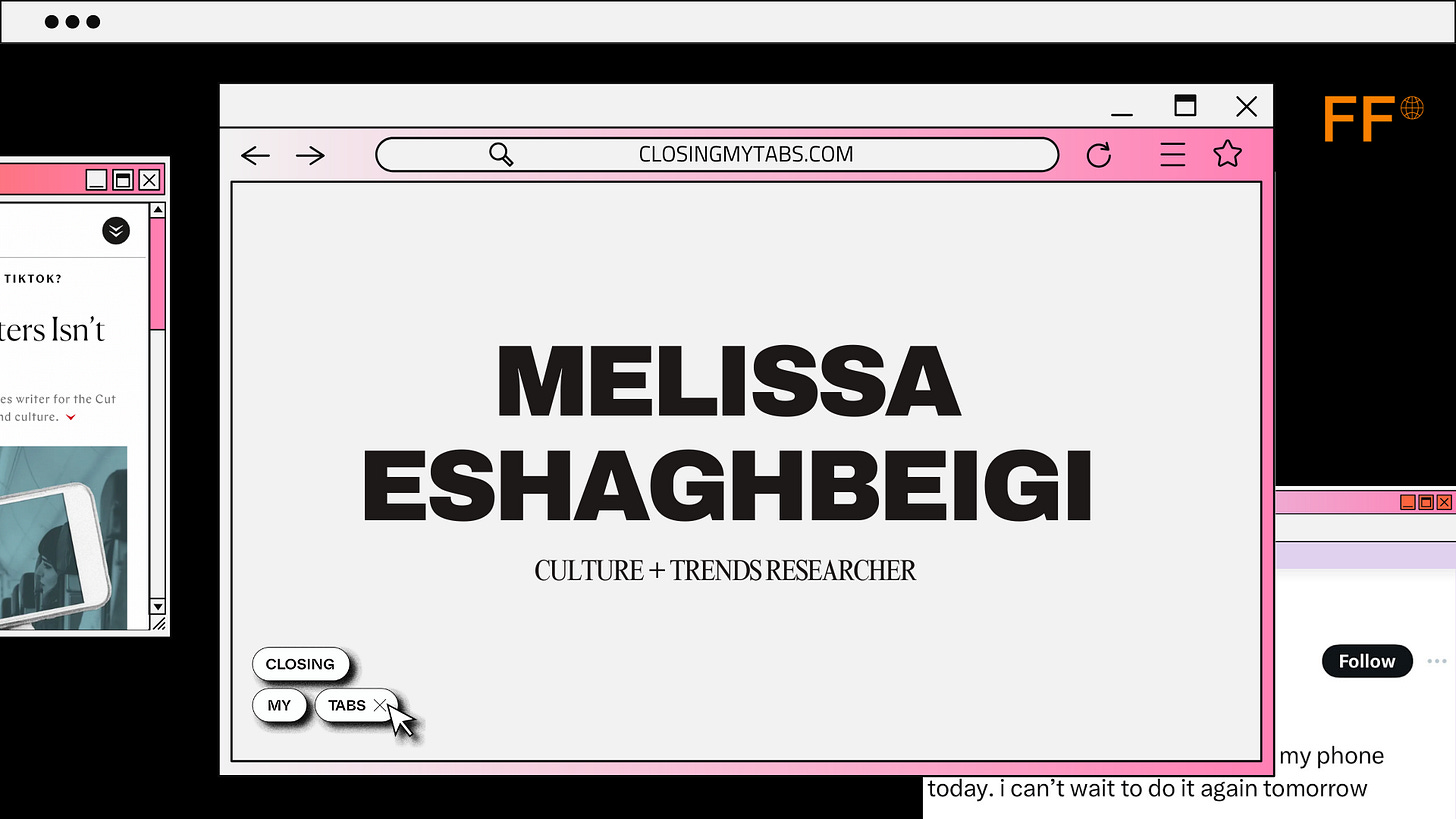
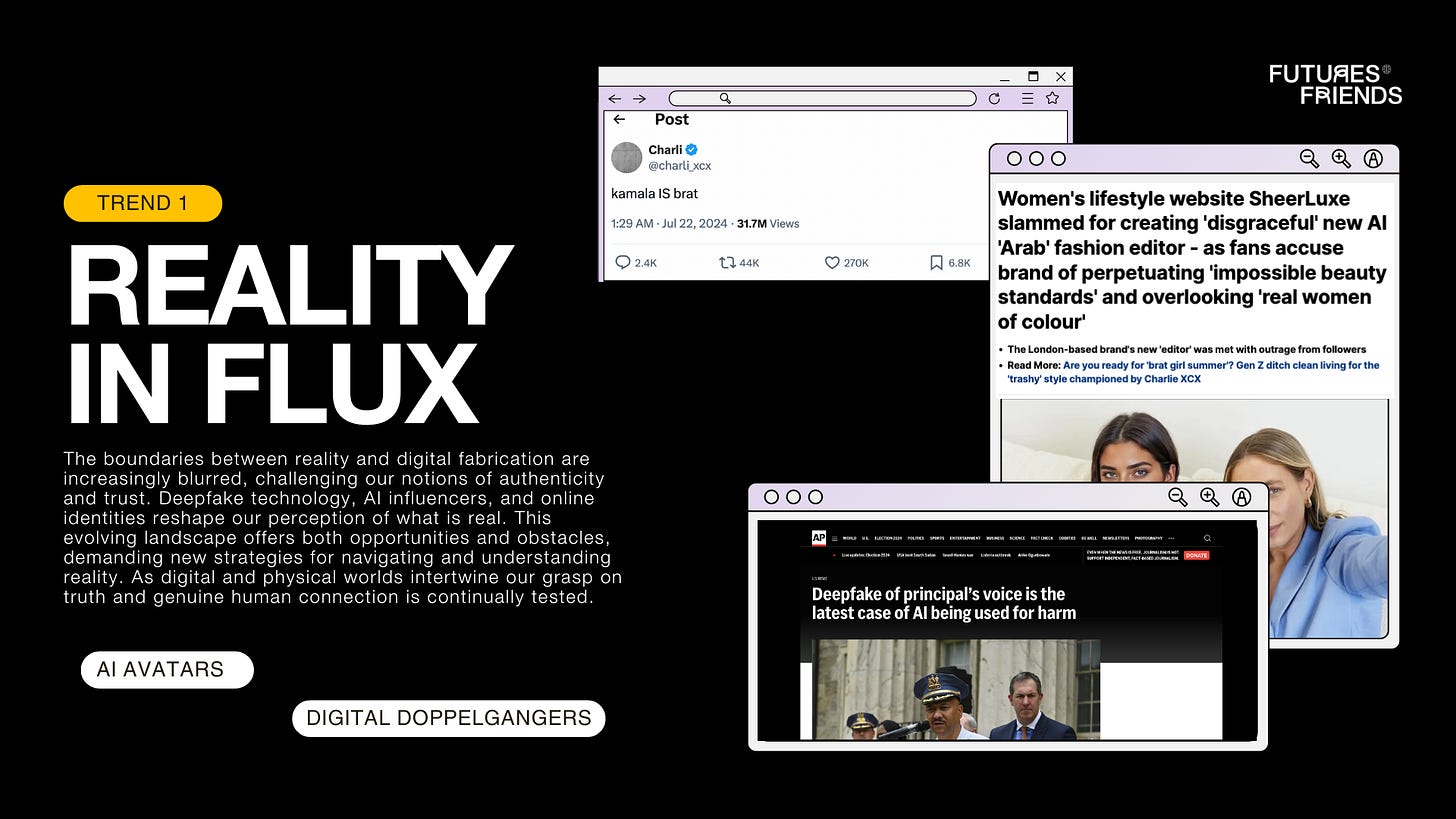
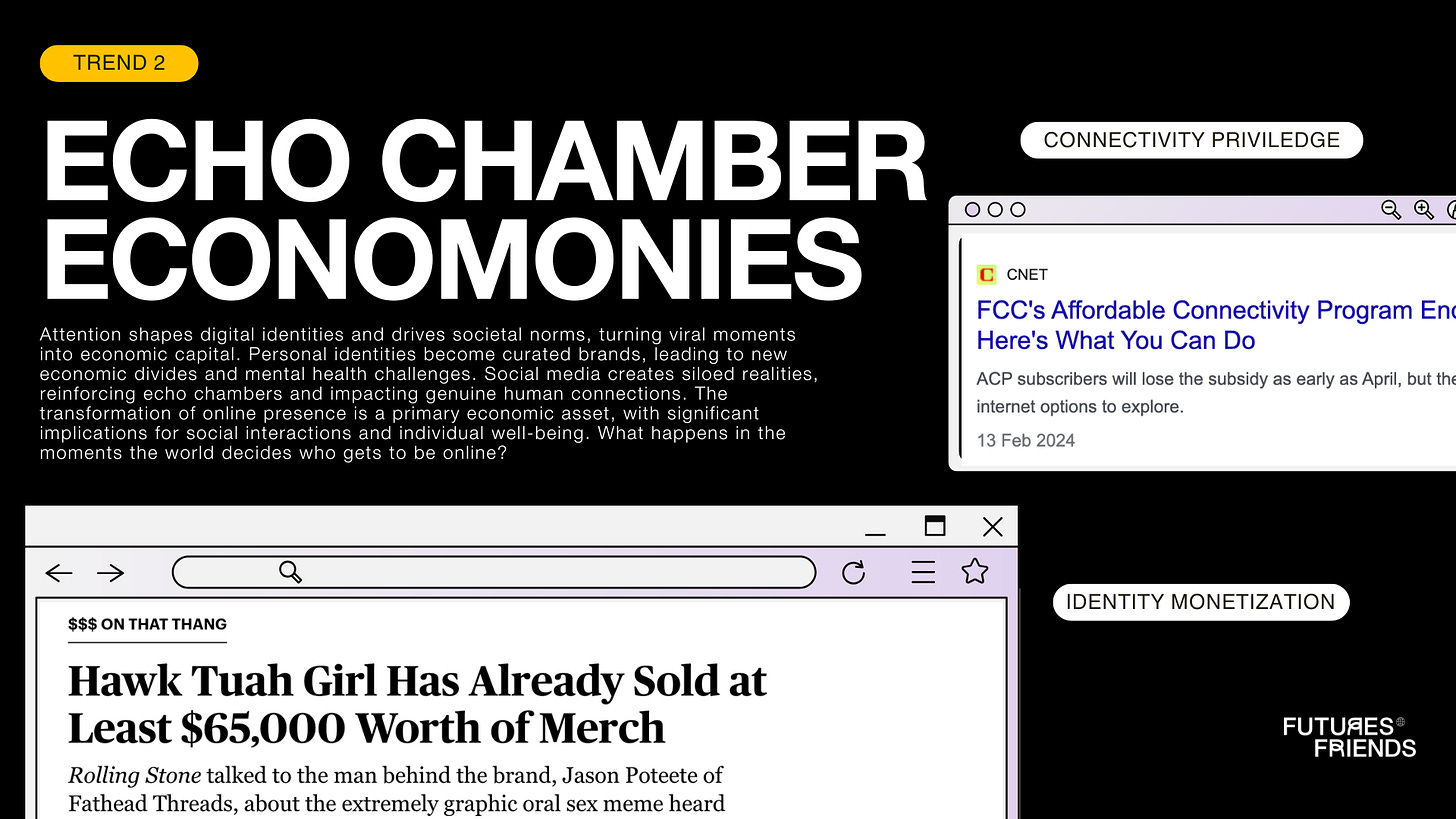

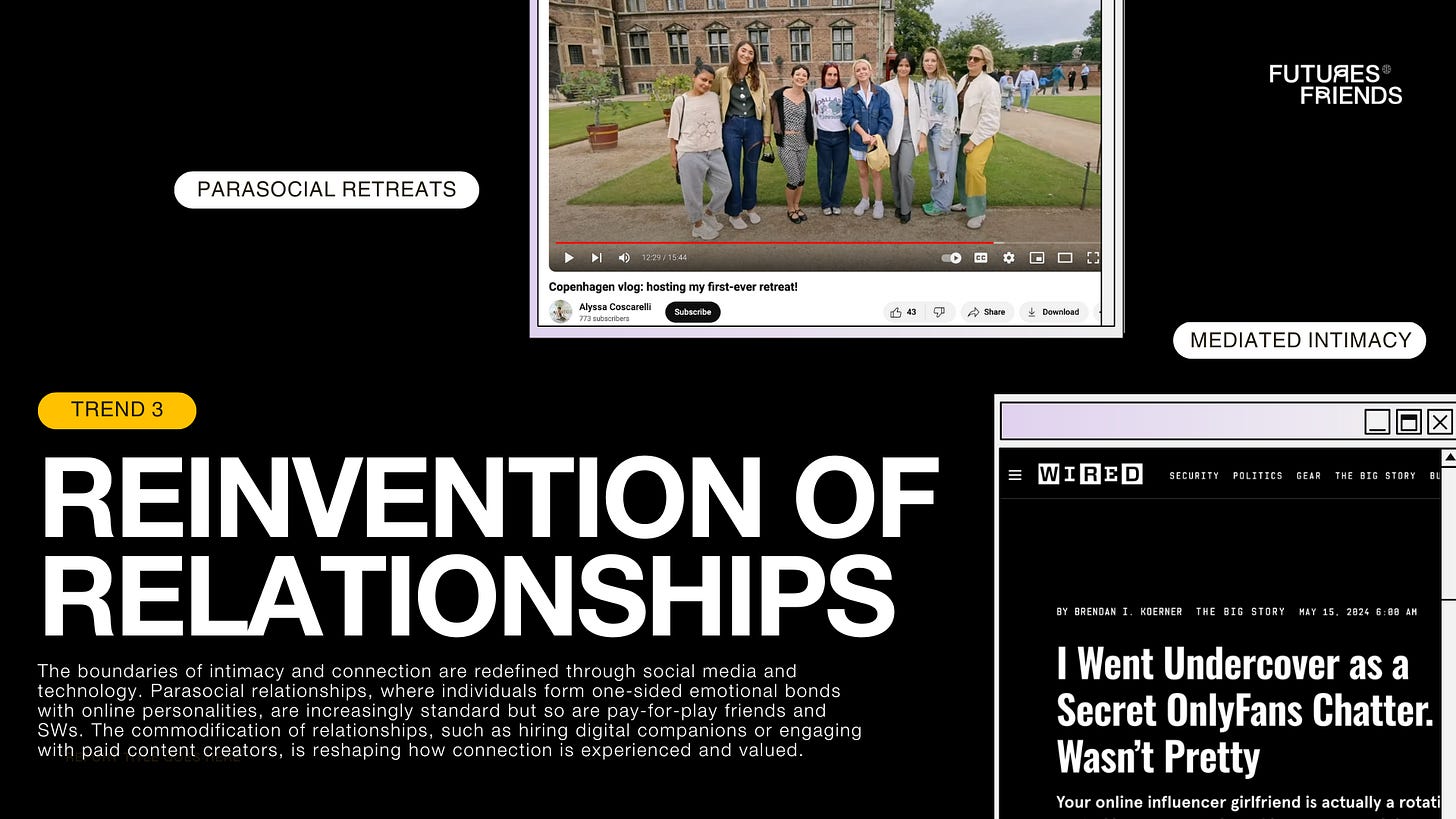
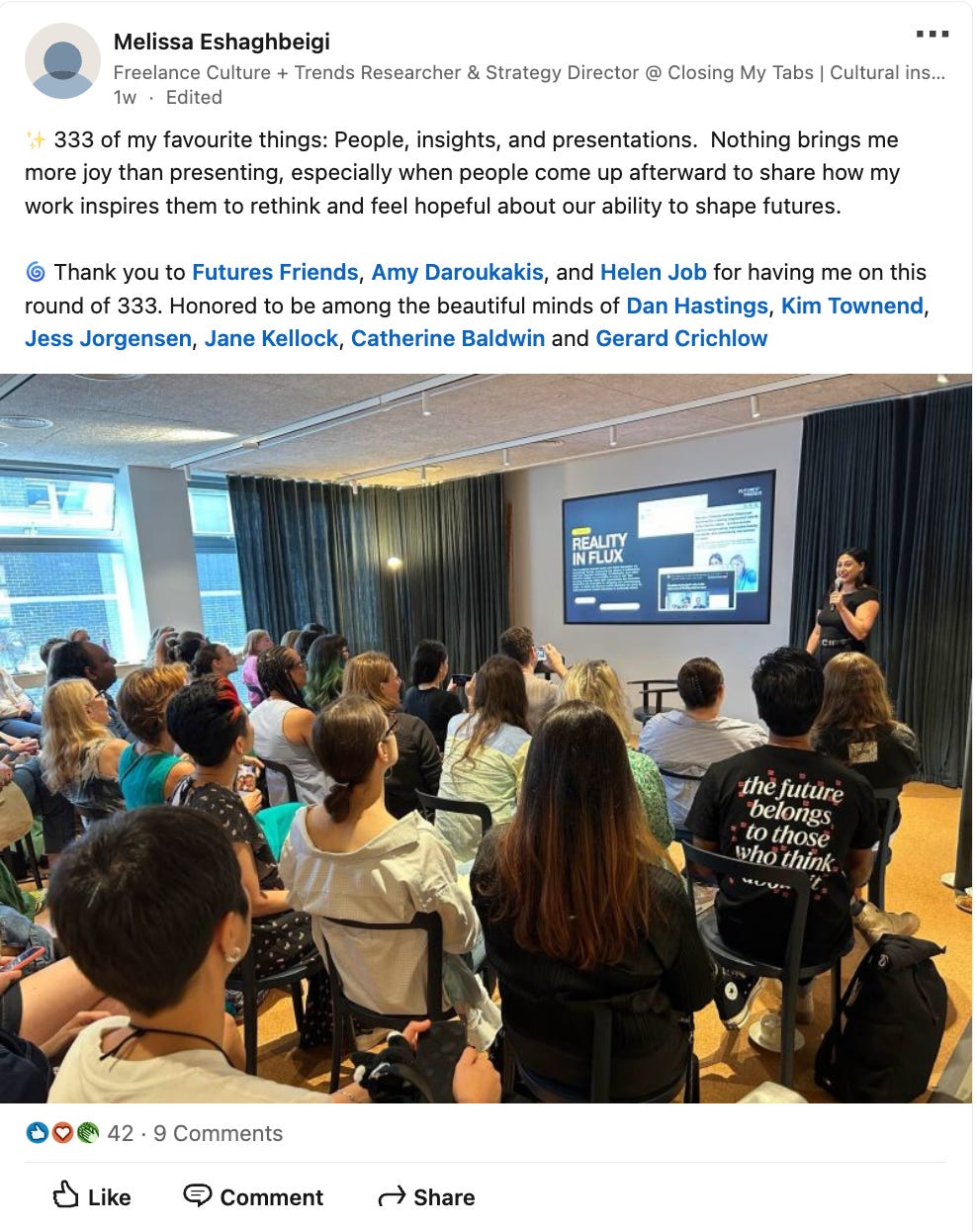
I love this. So nuanced and smart. I specifically think (read:worry) a lot about your points in the Reinvention of Relationships from a health point of view. Our reptilian brains can't evolve at the pace of technology and I wonder about the long term affect these new types of relationships will have on our well-being. While certain needs might appear to be met through this reinvented intimacy (they have for me), I fear that the murkier parts of our psyche might suffer intimacy deficiency and the symptoms won't reveal themselves until much later. After reading this I'm craving a juicy futurist brainstorm session re: the state of intimacy in 2044 lol.